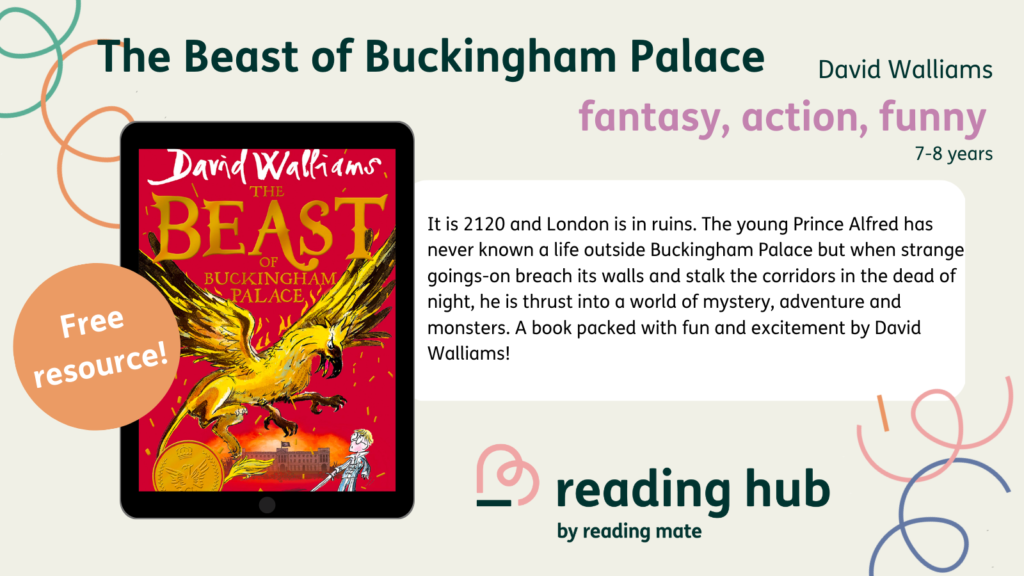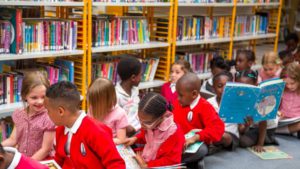Finding the right reading solution for your learners can be a daunting task. With so many different reading apps, programs and tools available, it can be hard to know which one is right for you. But the most important part for your reading solution is access to books! In this article, we’ll outline the importance of reading and uncover the reality of library access in schools vs. prisons. Reading can be a tedious task for some, but with the right reading solution, it can be a lot more fun and interesting and this blog will discuss a solution that provides your learners with greater access to books and opens their gateway to learning. So read on and find out more!
- How can children get access to books they will want to read?
- How important are school libraries?
- Libraries in prisons
- Is there a link between poor literacy and prison?
- How can schools provide better access to reading materials?
- What are the benefits of digital libraries?
- How do I make eBooks enticing for my learners?
- How do I stop learners getting distracted when reading on a tablet?
- Tips on how to make reading more enjoyable for your learners
- Reading solutions that we found work really well
Looking for lesson ideas and resources to help in the classroom? Check out this series of activities for The Beast of Buckingham Palace by David Walliams.

How can children get access to books they will want to read?
One way for children to get access to books they will want to read is by visiting their local library. Many libraries have a wide selection of books for children of all ages and interests, and many also offer programs and events specifically for children. Additionally, many schools have libraries or partnerships with local libraries that provide students with access to books. Another option is for parents to purchase books for their children or to encourage them to use online resources to access e-books or audiobooks.
How important are school libraries?
School libraries are important because they help children learn to read and provide children with reading materials and a safe place to read. Additionally, they can help children find interesting reading material that is suited for their particular reading level. School libraries also help children learn about reading strategies and give them the opportunity to practice reading in a supportive environment. With the help of school libraries, children have access to books and resources that can help them become better readers.
We’re all very aware of the impact COVID-19 has had on young peoples’ academic and social development. But on top of this there’s been cuts to public libraries in the UK, meaning the humble school library plays an even more vital role.
1 in 7 schools don’t have a library at all – Literacy Trust
As a teacher, and a reader, this is deeply saddening. Libraries are so much more than books, they’re a safe haven for some learners, an escape for others as well as a learning hub, quiet place to learn and a resource for technology. All of these things (and much more) are reasons why school libraries are essential for those disadvantaged learners.
These learners are disproportionately disadvantaged when it comes to access to the above things. All of this combined is what could eventually lead to lack of vital skills (such as reading), confidence and overall ambition. Therefore, they could disengage with learning entirely and spiral towards a less successful or even criminal future.
Did you know that it’s a statutory requirement for all prisons to have libraries in the UK but not schools?

I don’t know about you but when I found this out, I was shocked.
Don’t get me wrong, I think it’s brilliant that every prison is equipped with a library. And that shouldn’t change. But (and it’s a big one) there’s a part of me that thinks: how different would prisoner’s outcomes have been if they had equal and adequate access to books and were encouraged to read as children? Would they still have ended up there?
Or perhaps this is the very reductive and whimsical point of view of a teacher?
Is there a link between poor literacy and prison?
The prison population in the UK is the third highest in Europe (The Justice Gap, 2021). It’s well documented that prisoners will often have poor literacy compared to the general population. As a result, literacy is often thought to be attributed to a criminal career. This is often why literacy interventions (such as statutory libraries) are employed as a solution to these problems. Whilst there’s certainly merit to these programs, the reality of this relationship is far more complex.
There’s evidence to suggest that the population of prisons is not representative of the general population as a whole.
In fact, if you were to compare prisoners with their socio-economic equivalents who are non-offenders, their literacy skills would be very similar (Literacy Trust, 2008).
This suggests to me that although there’s a proportion of prisoners that struggle with reading and writing, there may not be a direct link to this and their imprisonment.
With that in mind it’s important to remember that people end up in prison for huge range of reasons including drug abuse, anger issues, debt, relationship issues, homelessness, mental health issues, unemployment, low aspirations, and the list goes on.

On the flip side, I certainly feel that learning to read is an invaluable skill for prisoners. According to the Shannon Trust, some prisoners would tick the same menu option every day rather than admit they’re unable to read the other options. Additionally, this skill enables them to, for the first time in their lives, read letters from home, fill out application forms and even read a menu.
Therefore, revoking libraries within prisons and the accompanying interventions would be reckless.
Especially when you consider that 50% of people in prison have a literacy level at or below that expected of a child leaving primary (Ian Merrill, CEO Shannon Trust, 2021).
How can schools provide better access to reading materials?
Reading materials are a huge cost to schools and parents. With funding being cut and prices going up, this leaves little room for money for books. That’s why digital reading solutions could be hugely cost-effective for schools up and down the UK. Digital reading platforms like Reading Hub enable learners to have access to thousands of the most popular reading books in and out of school for as little as 25p a book.
No longer will schools have to worry about a dwindling supply, keeping up with the latest trends or replenishing broken, lost and damaged books. Learners can now read multiple books at one time and share the same books as their peers.
What’s the importance of school libraries?
We’re all very aware of the impact COVID-19 has had on young peoples’ academic and social development. But on top of this there’s been cuts to public libraries in the UK, meaning the humble school library plays an even more vital role.
As a teacher, and a reader, this is deeply saddening. Libraries are so much more than books, they’re a safe haven for some students, an escape for others as well as a learning hub, quiet place to learn and a resource for technology. All of these things (and much more) are reasons why school libraries are essential for those disadvantaged students.

These learners are disproportionately disadvantaged when it comes to access to the above things. All of this combined is what could eventually lead to lack of vital skills (such as reading), confidence and overall ambition. Therefore, they could disengage with learning entirely and spiral towards a less successful or even criminal future.
What are the benefits of digital libraries?
There are several benefits to using a digital library. One of the main benefits is convenience. With a digital library, people can access books and other materials from any device with an internet connection, which means they can read or listen to books while they are on the go. This can be especially useful for people who may not have easy access to a physical library, such as those who live in rural areas. Digital libraries can also be a cost-effective option, as they often offer free or low-cost access to a wide range of materials. Additionally, digital libraries can save space, as they do not require the physical storage of books and other materials.
Reading electronically has many benefits over reading hard copy books. For one, you can adjust the font size to make it larger or smaller depending on your needs. Additionally, reading electronically gives you the ability to highlight and make notes in the text, as well as search for specific words or phrases. This makes it easier to find information and remember key points from the text. Lastly, electronic reading is more environmentally friendly than reading hard copy books, as it requires less paper and results in less waste.
How do I make eBooks enticing for my learners?
There are several ways to motivate a child to read an eBook. One approach is to make the reading experience interactive and engaging. For example, you could use a tablet or e-reader that allows the child to highlight and take notes on the text, or to access interactive features such as quizzes or games. You could also encourage the child to personalize the reading experience by choosing books that align with their interests or by setting goals for how much they want to read each day. Additionally, you could try offering rewards or incentives for reading, such as allowing the child to earn extra screen time or a special treat for completing a certain number of pages or chapters. Finally, you could model good reading habits by reading eBooks yourself and discussing the books you are reading with the child.
How do I stop learners getting distracted when reading on a tablet?
Here are a few strategies for helping your child avoid distractions:
- Set up a designated reading space that is free from distractions such as television, music, and other noise.
- Encourage your child to break up their reading time into smaller, manageable chunks and to take regular breaks to rest their mind and recharge.
- Help your child prioritize their tasks and to focus on the most important or challenging ones first. This can help them to stay motivated and on track.
- Talk to your child about the importance of staying focused and help them to develop strategies for avoiding distractions, such as setting aside specific times for breaks.
- Provide support and encouragement to your child and let them know that it’s okay to ask for help if they are struggling to concentrate.
Overall, it’s important to be patient and understanding and to work with your child to find what works best for them in terms of staying focused and avoiding distractions.
Tips on how to make reading more enjoyable for your learners
There are several ways to make reading more enjoyable for your students. One way is to provide a variety of reading materials that interest them. This could include books, magazines, comics, newspapers, and online articles. You can also encourage your students to read out loud and discuss what they’ve read with one another. Additionally, you can set aside time for reading each day and make it part of the class routine. Finally, praise your students when they exhibit reading skills and progress.
Reading solutions that we found work really well
There are a number of reading solutions that work well for children. One solution is reading apps. Reading apps are software programs that allow children to read books electronically. They can be downloaded onto phones, tablets, or computers. Our Reading Hub – Learner app allows all learners to read any book, anywhere; at school, at home, on the bus, in the park – their reading possibilities are endless! Learners can choose from a wide range of thousands of popular and exciting eBooks to make reading fun, as well as accessible. These are great ways to get books into the hands of your learners!
Another solution is reading programs. Reading programs are usually software or online programs that help children learn to read. Reading Hub has a software for teachers, allowing you to see valuable insights into your learners’ reading progress; including how many books they’ve read and how engaged they are with reading, using our unique algorithm. This can help with developing interventions, assigning tasks, and ensuring no learner gets left behind.
Lastly, school libraries are an important reading solution. School libraries have different reading materials that can help children learn more about reading. They also have teachers who can help children learn how to read better.
Reading Hub was designed to be a reading solution for all
Providing equal opportunities to every learner through thousands of the best and most popular eBooks available, Reading Hub ensures no child misses out on the opportunities available through reading.
Learners are supported with reading in school and at home.
School leaders and teachers receive valuable insights into the quality of their learners’ reading, as well as enjoyment and progress: on an individual, group and whole school scale. Parents can keep up-to-date with their child’s reading progress too and share their feedback from home.
Find out more by accessing your free Reading Hub information pack.
We’ve included a few key takeaways to remember below: – Reading electronically has many benefits, such as adjustable font sizes, the ability to highlight and make notes, and environmental friendliness. – There are several ways to make reading more enjoyable for your students, including providing a variety of reading materials, encouraging discussion about readings, setting aside time for reading each day, and praising reading progress. – School libraries play an important role in helping children learn to read. They offer different reading materials and have teachers who can help children become better readers. =>We encourage you to try out some of these tips with your learners and see how they improve their reading skills!
It would be naïve to think improving literacy skills would reduce prison numbers. However, I do think it’s important to identify the need for more support with reading for children from disadvantaged socio-economic backgrounds.
Prevention is the best form of cure after all, isn’t it?
In conclusion, reading solutions are an important tool for children to use to improve their reading skills and gain a better understanding of reading materials. By providing a variety of reading materials, encouraging children to read out loud and discuss what they’ve read with one another, setting aside time for reading each day and providing praise for reading progress, reading can become an enjoyable activity. Finally, the importance of school libraries should not be overlooked since they help children learn to read better and provide them with reading materials and a safe place to read. With the right reading solution, reading can become a fun and informative experience!
Would you like to give your learners the best children’s eBooks? Find them all on Reading Hub!
Related articles:


